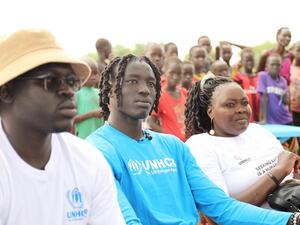Burundians continuing to flee the country one year after crisis began
Burundians continuing to flee the country one year after crisis began
One year after the Burundi crisis began, almost 260,000 people have fled to nearby countries and thousands more could join them over the rest of the year unless a political solution is found and a descent into civil war averted.
People continue to arrive in neighbouring countries, albeit in smaller numbers in recent weeks as it becomes harder to cross borders. Many asylum seekers or new arrivals report human rights abuses in Burundi, including torture, sexual violence, arbitrary detention, intimidation, forced recruitment by militia, killings and extortion. To date, 259,132 people have fled the country, and we are planning our humanitarian response based on a figure of some 330,000 refugees by year's end.
Continuing international support is needed to help ease the tension and encourage an inclusive dialogue. With mass returns not currently expected soon, UNHCR will in the coming year put greater emphasis on education for children and youth, and encourage refugees to become self-sufficient at a time when budget shortfalls are leading to cuts in some assistance.
UNHCR is seeking almost US$175.1 million for its Burundi crisis operations this year, but has received only US$47.8 million to date, or some 27 per cent. This means we are struggling to provide even the basics such as shelter, household items and latrines. The provision of services such as specialized counselling, care for the disabled and elderly, protection of the environment and even primary health care may also fall by the way side.
Meanwhile, the worsening economic conditions inside Burundi could exacerbate the situation, fuelling further displacement and making return conditions less favourable. Most of the refugees and thousands of internally displaced will probably not return home under present conditions.
But for those in Tanzania (135,941 refugees), Rwanda (76,404), Democratic Republic of the Congo (22,204) and Uganda (24,583), conditions in exile are tough and a large influx would make their lives even more challenging.
These countries continue to generously accept people, despite space restrictions and capacity problems. But they will need increased international support to host more people. We urge host countries to keep their doors open and donors to continue and step up support for the refugee response.
In Burundi, the situation one year on is tense and marked by sporadic violence, which has killed more than 400 people since last year. People continue to cross from the provinces of Ruyigi, Muyinga, Kirundo, Rutana, Makamba, Rumonge, Bujumbura and Kibitoke to neighbouring countries, but there are also small numbers of people returning spontaneously. At least 25,000 people have fled to safer areas in Makamba, Rutana and Kirundo, but freedom of movement is becoming harder.
TANZANIA
Tanzania, which hosts the largest number of Burundian refugees, has been admitting an average 130 people a day. The bulk of the newly arrived Burundian refugees (more than 71,000) are living in the overcrowded Nyarugusu camp, which is now one of the largest refugee camps in the world with 140,540 refugees. Conditions are very difficult and UNHCR has put a priority on decongesting the camp. The rest live in Nduta and Mtendeli camps, which were reopened to ease congestion in Nyarugusu. But Nduta has reached its 55,000 capacity and from next week new arrivals will be taken to Mtendeli.
Management of the environment is a key issue in Tanzania, with deforestation in and around the refugee camps a concern for UNHCR. The government has asked us to stop using wooden poles to erect shelters and to distribute fuel-efficient stoves.
RWANDA
In Rwanda, new arrivals continue to be registered at a rate of around 130 per week. More and more urban refugees are approaching UNHCR to move to Mahama camp, in Eastern province, after spending the last of their savings to keep alive. This adds to the urgent need to construct more shelters in the camp, which is home to nearly 48,500 refugees-nearly half of whom are children.
UGANDA
In Uganda, the rate of new arrivals has been relatively stable in recent weeks, averaging between 150-250 week (25-35 a day) in April. Last week saw 167 Burundian refugees arrive at the Nakivale settlement in the southwest of the country. Refugees report difficulties crossing borders, especially without papers.
DEMOCRATIC REPUBLIC OF THE CONGO
The number of Burundian refugees in the Democratic Republic of the Congo (DRC) has steadily increased. About 900 refugees were registered in each of the first three months of the year. They included newly arrived Burundians and those who have been in the country for a while.
Most are staying at the Lusenda camp, which now hosts more than 16,000 refugees and has a capacity for 18,000. Other refugees are staying with host families in straitened circumstances. To improve conditions, UNHCR has this year built more shelters and health facilities and upgraded the water system. Supporting peaceful coexistence between refugees and the host community is a priority.
For further information on this topic, please contact:
- In Bujumbura, Bernard Ntwari, [email protected], +257 78 310 564
- In Kigali, Erika Fitzpatrick, [email protected], +250 788 38 98 28
- In Kigali, Martina Pomeroy, [email protected], +250 788 38 9828
- In Kampala, Charles Yaxley, [email protected], +256 (0) 776 720 045
- In Kinshasa, Andreas Kirchhof, [email protected], +243 81 700 9484
- In Dar es Salaam,Stephen Mhando, [email protected], +255 784 730 424
- In Dar es Salaam,Daria Santoni, [email protected], +255 22 260 2708 ext 2760
- In Geneva, Leo Dobbs, [email protected], +41 79 883 6347








